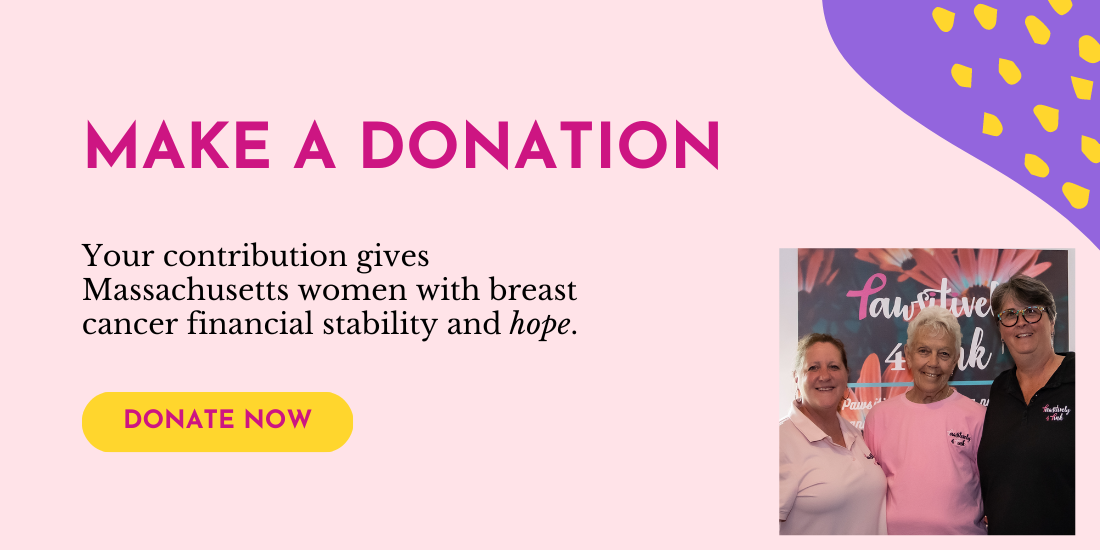Breast cancer affects millions of women worldwide, but unfortunately, the cost of treatment often becomes a nearly insurmountable barrier for many patients. At Pawsitively 4 Pink, we know this all too well, and this is the reason why we made it our mission to help underserved women fighting breast cancer in Massachusetts.

The rising cost of healthcare, coupled with the complex nature of breast cancer treatment, can become a burden on individuals and their families. From diagnostic tests to surgery, chemotherapy, and radiation therapy, the expenses can quickly escalate. Moreover, the financial strain is not limited to medical bills alone; it extends to transportation, childcare, and loss of income due to missed work.
Faced with this kind of financial hardship, many patients are left having to make difficult decisions, potentially compromising their well-being even further. It is crucial to address the financial challenges in breast cancer treatment, as no one should have to choose between their health and financial stability.
Let’s explore the significant impact of the cost barrier on breast cancer care and discover the initiatives and resources available to support patients during this challenging journey.
The Rising Cost of Breast Cancer Care
The cost of breast cancer treatment has been steadily rising over the years, posing a significant challenge for patients in need of care. Indirect factors such as the increasing prices of medical services, medications, and specialized equipment also contribute to the overall high cost of treating breast cancer.
Moreover, the issue of affording breast cancer care does not only involve medical expenses. Patients often face additional bills related to transportation to and from doctor’s appointments, lodging for out-of-town treatments, and the need for specialized care or assistance, such as childcare support.
The rising cost of breast cancer treatment not only affects patients during their active treatment phase but can also have long-term financial repercussions. Survivors may continue to face financial challenges post-treatment, including ongoing medical expenses, follow-up care, and potential loss of income due to lingering health issues. This is why, at Pawsitively 4 Pink, we continue to support patients even after treatment.
The Impact of Financial Burden on Breast Cancer Patients
The financial burden associated with breast cancer care can have a serious impact on patients, affecting their physical and emotional well-being, treatment decisions, and overall quality of life. The stress of managing high medical costs can lead to anxiety, depression, and feelings of helplessness, all of which can negatively impact the patient’s ability to cope with their diagnosis and treatment. Financial issues can also influence treatment decisions: patients may decide to go for less effective or abbreviated treatments due to financial constraints.
In some cases, the financial burden of breast cancer treatment can lead to long-term financial instability, impacting the patient’s ability to return to work, advance their career, or maintain financial security. The loss of income during treatment, coupled with ongoing medical expenses, can create a cycle of financial hardship that persists even after completing active treatment.
The Role of Nonprofit Organizations: Why Donating to Nonprofits Can Change Lives
Nonprofit organizations play a vital role in supporting breast cancer patients by providing financial assistance, emotional support, and resources to help navigate the complexities of the breast cancer journey. These organizations, such as Pawsitively 4 Pink, rely on donations and fundraising efforts to sustain their programs and services, making every contribution a valuable investment in improving the lives of those affected by breast cancer. By donating to nonprofits that focus on supporting breast cancer patients, you can make a great difference in the lives of those facing financial hardship. Check out this page to learn how to donate by cost to help someone afford groceries, rent, medication, bills, and more.
One of the primary ways in which nonprofit organizations like ours help breast cancer patients is by offering financial assistance to cover medical expenses, transportation costs, housing accommodations, and other essential needs. By alleviating the financial burden associated with treatment, these organizations enable patients to focus on their recovery and well-being without the added stress of mounting bills. Additionally, at Pawsitively 4 Pink, our volunteers do an amazing job of driving patients to and from their appointments, offering childcare support, and organizing our fundraiser events.
Without donations, this system would not work, and a nonprofit like Pawsitively 4 Pink could not exist.
Fundraising and Community Support for Breast Cancer Patients
Fundraising and community support are among the top choices for nonprofits when it comes to providing financial assistance and resources to breast cancer patients in need. In Massachusetts, organizations like Pawsitively 4 Pink host fundraiser events and many different initiatives to raise funds for underserved women fighting breast cancer. These efforts not only generate financial support but also raise awareness about the challenges faced by breast cancer patients and the importance of access to affordable care.
Through creative fundraising events such as charity walks, concerts, and sports tournaments, our organization engages the community and mobilizes support for the cause. By participating in our events, you make a tangible impact on the lives of breast cancer patients and contribute to a more supportive and compassionate community.
Community support is essential for sustaining the work of organizations like Pawsitively 4 Pink and ensuring that underserved women have access to the resources and assistance they need during their cancer journey. Whether through volunteering, fundraising, or spreading awareness, every act of kindness and support contributes to creating a more compassionate and inclusive community for those affected by breast cancer.
